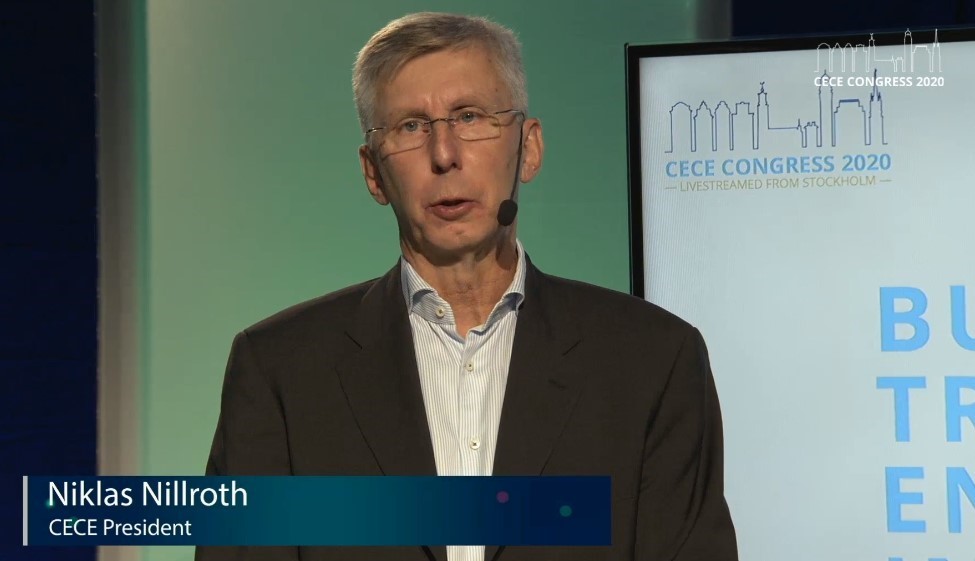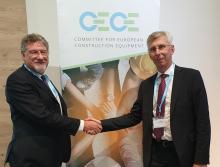
The delegates heard details about the EU's support package for construction equipment and other manufacturers post-COVID-19, as well as the latest developments in sustainability, digitalisation and regulation.
During an opening panel debate, CECE secretary general Riccardo Viaggi said the EU's European Recovery Plan is "an historic moment" in making available €750bn of fresh finance for economies to kickstart investment and growth.
"This money will go to finance projects on the ground at the local, national and regional level," said Viaggi. "It should really deliver growth, jobs and infrastructure investment."
He added that the national Recovery Plans need to prioritise construction and infrastructure projects, which create jobs and prosperity at a local level. Viaggi said he was satisfied with the EC's recovery plans: "The EU has proven to meet the historical demands that COVID brought to us."
There is a continuing need for infrastructure in Europe, but Viaggi said the ageing population in some of the region's countries is "a societal challenge" for construction companies, 60% of which are SMEs.
"In certain countries the vast majority of small and medium construction businesses are owned by people who are nearing retirement age," he added. "There are no succession plans and there are no new small business owners taking up the challenge. There is going to be a hole and I personally believe this is one of the economic challenges that the EU is not facing. We are not facing the demographic change, and in a labour intensive industry like construction this is felt so much."
He added that increased automation of the industry was one response to the problem, but that politicians should also be addressing the issue.
Kerstin Jorna, director general of the Directorate-General for Internal Market, Industry, Entrepreneurship and SMEs at the European Commission said that construction plays a decisive role in the European economy.
She added that 30% of all the energy used in the EU is for heating and cooling, 40% of emissions come from existing buildings and 30% of the total waste is construction waste. In this setting, the EU Renovation Wave to improve the energy efficiency of buildings in Europe is the cornerstone of construction’s recovery. “I invite you to ride the wave; the Renovation Wave is your sector’s industrial strategy,” said Jorna.
The impact of COVID-19 on the construction equipment sector is immense. According to Chris Sleight, MD of Off-Highway Research, the revised forecast for global construction equipment sales (units) in 2020 is -16%. This was around -5% before the pandemic. The economic environment will be weak and the performances will depend on which recovery actions will be put in place by national and regional authorities to relaunch spending and economic activities.
CECE president Niklas Nillroth said that the organisation's focus areas include improving the market conditions, sustainability and productivity of the construction equipment sector. Referring to the Congress theme of "Building Trust, Enabling Innovation", Nillroth said that, to maintain its place at the forefront of industry innovation the construction equipment sector in Europe needed to change and strengthen its activities in areas such as collaboration.
"Competition from other areas of the world is stepping up," he added. "To keep and strengthen our leadership we need to open up to our clients and customers in the value chain, and also towards our suppliers. By working with all these stakeholders we will build trust, which will enable innovation."
Chair of the CECE technical commission Stefan Nilsson said the most pressing current regulatory issue facing the industry is the need for clarification of the specifications for the ECHA (European Chemicals Agency) SCIP database. SCIP (substances of concern in products) is a database for information on substances of concern established under the Waste Framework Directive. It is intended to promote the circular economy and give waste operators and the public access to information about the presence of substances of very high concern (SVHCs) in products and waste materials.
Companies supplying products containing SVHCs on the EU market have to submit information on these articles to ECHA by 5 January 2021.










